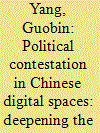|
|
|
Sort Order |
|
|
|
Items / Page
|
|
|
|
|
|
|
| Srl | Item |
| 1 |
ID:
096690


|
|
|
|
|
| Publication |
2010.
|
| Summary/Abstract |
From the earliest years of the Internet's creation, cyberspace has been distinguished from other types of political space because of three unique qualities: (i) its ability to mobilize users, particularly "outsiders" including those who have not been easily included in political systems using conventional means; (ii) its ability to quickly provide large quantities of information of uncertain or unregulated quality; and (iii) its ability to shrink distances between users, in some sense rendering conventional physical geography irrelevant. This paper presents three lenses for interpreting the significance of these developments: utopian, liberal, and realist. Evolving doctrines of cyberwarfare as put forth by China, Russia, and the United States in particular stress the ways in which cyberspace presents a unique security threat which may present greater advantages to nonstate actors engaged in unconventional warfare. Differing economic, political, and security policies derive from each lens.
|
|
|
|
|
|
|
|
|
|
|
|
|
|
|
|
| 2 |
ID:
133727


|
|
|
|
|
| Publication |
2014.
|
| Summary/Abstract |
Although research on the Chinese Internet is thriving, our understanding of its multidimensional character, its diverse forms, actors, and dynamics remains limited. This is due to a tendency to focus on technology at the expense of meaning and people, as well as a bias towards sweeping and dichotomous analytical categories, such as state vs. netizens, politics vs. entertainment, and authoritarianism vs. democracy. One of the perniciously appealing ways of sensationalizing the Chinese Internet falls under this either/or dichotomy. The seven contributions in this special issue of China Information challenge such binaries, thus deepening the critical inquiry into the multiple dimensions of the Chinese Internet. The authors show a more complex and nuanced picture of actors and contestation in Chinese digital spaces, as well as the symbolic forms and consequences of these contestations, illuminating new meanings of the political and new dimensions of digital contestation, including race, class and their interactions with the nation. Together, these articles exemplify an analytical orientation that I refer to as 'deep Internet studies'. They explore the Internet as a facet of a deep China by linking it to people's practical, perceptual, and moral experiences as well as to the contexts of institutions, politics, and policies.
|
|
|
|
|
|
|
|
|
|
|
|
|
|
|
|
|
|
|
|
|